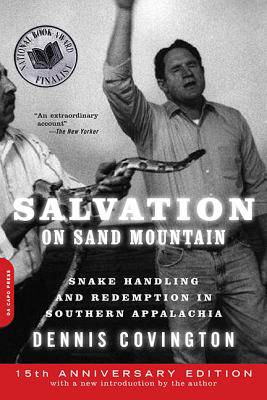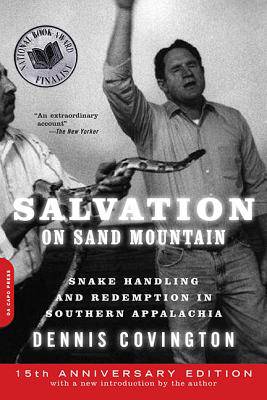
- Afhalen na 1 uur in een winkel met voorraad
- Gratis thuislevering in België vanaf € 30
- Ruim aanbod met 7 miljoen producten
- Afhalen na 1 uur in een winkel met voorraad
- Gratis thuislevering in België vanaf € 30
- Ruim aanbod met 7 miljoen producten
Zoeken
Salvation on Sand Mountain
Snake Handling and Redemption in Southern Appalachia
Dennis Covington
Paperback | Engels
€ 12,95
+ 25 punten
Omschrijving
It is Scottsboro, Alabama, in the fall of 1991. A snake-handling preacher by the name of Glendel Buford Summerford has just tried to murder his wife, Darlene, by snakebite. At gunpoint, he forces her to stick her arm in a box of rattlesnakes. She is bitten twice and nearly dies. The trial, which becomes a sensation throughout southern Appalachia, echoes familiar themes from a troubled secular world - marital infidelity, spouse abuse, and alcoholism - but it also raises questions about faith, forgiveness, redemption, and, of course, snakes. Glenn Summerford is convicted of attempted murder and sentenced to ninety-nine years in prison. When Dennis Covington covered the trial of Glenn Summerford for The New York Times, a world far beyond the trial opened up to him. Salvation on Sand Mountain begins with a crime and a trial and then becomes an extraordinary exploration of a place, a people, and an author's descent into himself. The place is southern Appalachia - a country deep and unsettled, where the past and its culture collide with the economic and social realities of the present, leaving a residue of rootlessness, anxiety, and lawlessness. All-night video stores and tanning salons stand next to collapsed chicken farms and fundamentalist churches. The people are poor southern whites. Peculiar and insular, they are hill people of Scotch-Irish descent: religious mystics who cast out demons, speak in tongues, drink strychnine, run blowtorches up their arms, and drape themselves with rattlesnakes. There is Charles McGlocklin, the End-Time Evangelist; Cecil Esslinder, the red headed guitar player with the perpetual grin; Aunt Daisy, the prophetess; Brother Carl Porter; Elvis Presley Saylor;Gracie McAllister; Dewey Chafin; and the legendary Punkin Brown, all of whose faith illuminates these pages. And then there is Dennis Covington, himself Scotch-Irish, whose own family came down off of Sand Mountain two generations ago to work in the steel mills of Birmingham, and
Specificaties
Betrokkenen
- Auteur(s):
- Uitgeverij:
Inhoud
- Aantal bladzijden:
- 288
- Taal:
- Engels
Eigenschappen
- Productcode (EAN):
- 9780306818363
- Verschijningsdatum:
- 1/08/2009
- Uitvoering:
- Paperback
- Formaat:
- Trade paperback (VS)
- Afmetingen:
- 137 mm x 208 mm
- Gewicht:
- 249 g

Alleen bij Standaard Boekhandel
+ 25 punten op je klantenkaart van Standaard Boekhandel
Beoordelingen
We publiceren alleen reviews die voldoen aan de voorwaarden voor reviews. Bekijk onze voorwaarden voor reviews.











